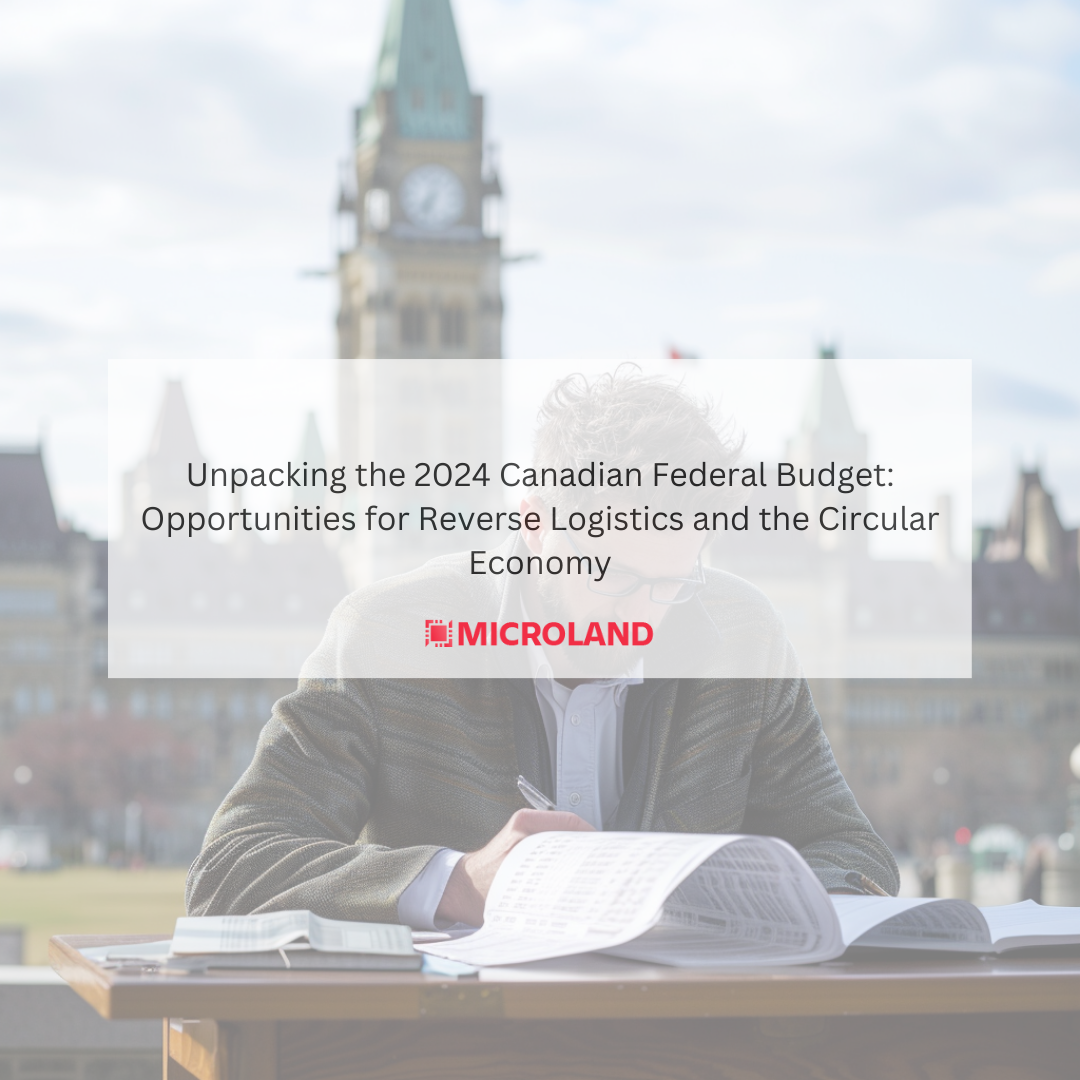Blog
Unpacking the 2024 Canadian Federal Budget: Opportunities for Reverse Logistics and the Circular Economy

Yesterday’s unveiling of the 2024 Canadian Federal Budget presents updated initiatives and incentives that are pertinent to stakeholders in the Reverse Logistics and Circular Economy sectors, especially those involved in electronics. Here we delve into specific updates and potential opportunities.
Enhanced Incentives for Sustainability
The budget introduces enhancements to the existing Clean Technology Manufacturing investment tax credit, specifically broadening its applicability. This expansion, while primarily targeting the EV supply chain, may also indirectly benefit the electronics sector. For instance, technologies developed for EV batteries could improve the efficiency of battery recycling processes in electronics, offering potential benefits to those involved in electronics refurbishment and recycling (Budget 2024, p. 177).
Support for Industry-Wide Technological Advancements
Although funding for AI and other high-impact technologies is generally aimed at a broad array of industries, these investments can be particularly beneficial for the sector. Developing AI tools for more accurate and faster diagnosis, tools to help technicians learn more advanced repair techniques and chatbots to help filter out No Fault Found units before they are shipping for repair are just some examples of things that could lead to more efficient refurbishment processes, crucial for the sustainability of reverse logistics operations (Budget 2024, p. 166). Furthermore, the focus on expanding skills training is set to increase workforce proficiency, especially in handling complex repairs in electronic devices, thereby bolstering capabilities in reverse logistics (Budget 2024, p. 60).
Tax Incentives for Economic Growth
The expansion of tax incentives for clean technology adoption now includes broader measures that could reduce costs for companies investing in environmentally sustainable technologies. This support encourages the growth of businesses that are adopting new, efficient technologies that reduce environmental impact (Budget 2024, p. 177).
Missed Opportunities
The 2024 Federal Budget, has overlooked specific needs crucial for the electronics sector in reverse logistics and circular economy:
- Targeted Electronic Waste Reduction Initiatives: No direct initiatives or funding to support the reduction of electronic waste through enhanced recycling processes or consumer engagement programs.
- Consumer Electronics Recycling Promotion: Lack of incentives for consumers to participate in electronics recycling, which is vital for boosting the circular economy.
- Clear Producer Responsibility Regulations: Absence of enhanced regulations that define producer responsibilities for the end-of-life management of electronic products, which could ensure more sustainable disposal and recycling practices.
- Funding for R&D in Electronics Recycling Technologies: No specific grants or funding opportunities mentioned for research and development in recycling technologies that could improve the efficiency and effectiveness of electronics recycling.
- Infrastructure Investments for Recycling Facilities: The budget does not address the need for investments in infrastructure that could support advanced recycling facilities specifically designed for electronic products.
- Promotion of within Canada Recycling and Refurbishing: To avoid dumping and landfilling in other countries, producers should be incentivized to recycle and refurbished products sold in Canada within Canada.
Capital Gains Tax Increase
Overshadowing the rest of the budget is the significant increase in the capital gains tax, raising the net capital gains tax rate from 27% to 36% (compared to 20% in the US). Higher capital gains taxes may deter investment in our sector, particularly in startups and innovative companies that rely on investment for growth and development. For businesses in these sectors, this could mean reduced capital for expansion, innovation, and improvement of operational efficiencies, potentially slowing the progress towards more sustainable business practices. Such a tax increase could also affect the overall attractiveness of investing in green technologies and recycling initiatives.
Microland is committed to assisting manufacturers and solution providers through the evolving Canadian service landscape. We provide expert insights and strategic guidance, ensuring that you can navigate these new governmental initiatives effectively and capitalize on emerging opportunities.
Stay connected with Microland for more in-depth analysis and updates on how the 2024 Federal Budget impacts the reverse logistics and circular economy in the electronics sector.
Are you looking to establish a respected service presence in Canada? Contact Us for more info
